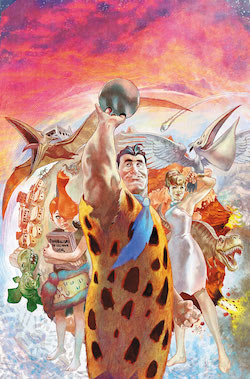Thursday Comics Hangover: The Bedrock of our society
You guys, I kind of hate myself for even writing this, but the new Flintstones comic book?
It's pretty good.
I know, I know. I've complained at length about the way publishers have dredged up licensed properties for children and turned them into grim fantasias for psychically injured man-babies. But this is not that. This is something else again.

All the new Flintstones comic does, is it takes the premise seriously. Within reason, mind you: author Mark Russell and artist Steve Pugh understand that the idea of a couch made out of a giant prehistoric otter is impossible to take seriously. But they're trying to build a coinvincing mythology around the city of Bedrock: Fred and Barney are veterans of a war to create civilization (they attend a veterans' group where everyone shares stories of atrocities they committed) and everyone worships a god called Morp.
And yes, the book is full of caveman puns (a bar called Homo Erectus, a restaurant called Wammoth Bammoth, Thank You Mammoth) and bad caveman technology jokes (a turtle waiter is a terrible idea.) But there's some sharp comedy, too: Fred's boss is trying to exploit cheap Neanderthal labor, and there's a suggestion of a larger story about the military-industrial complex and the way it keeps the masses in line.
The Flintstones comic is remarkable in the way it ties familiar sitcom tropes together with modern social issues. It's more sharply satirical than the Simpsons has been in decades, and it feels like a premise that could continue for a good long while, though I have no idea who the intended audience for this thing is. (But as an aside, I love artist Steve Pugh — his facial expressions and eye for detail are a large part of why the book is such a treasure — but I have no idea why he's chosen to give all the characters hyper-muscular superhero bodies. Everyone, even Fred's boss, the doughy corporate jackass known as Mr. Slate, is built like an Adonis or a Venus, and it's kind of distracting.)
Part of the Flintstones allure is that it's a comic aimed at an adult sensibility that doesn't ignore important parts of everyday life like family, or love, or friendship. It respects its characters and aims its comedy at targets that feel broad enough to be recognizeable, but specific enough to feel important. It's incredibly weird that this comic book works as well as it does, but we live in an incredibly weird world.